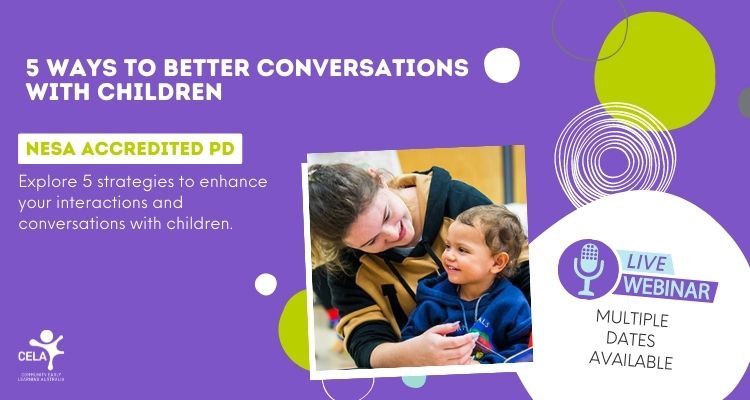So much of the learning and development which occurs in the early years is based on our interactions with children. After all, research shows that warm, back-and-forth interactions between a child and their caregiver makes their brain light up like nothing else. For this very reason, there is a wealth of literature around the ways we can respectfully and richly communicate with young children. Here are some great tips for ensuring that we keep respectful communication top of mind during our daily conversations and interactions with children:
Talk to the child about the child
Is there anything that anyone loves more than talking about themselves and their loved ones? When we interact with children about their life outside of the early learning setting, we are fostering their strong and meaningful connection to their family, as well as showing them that we have a genuine like and interest in them. We can talk to children about their siblings and parents, what was in their lunch box, or their favourite game at home. Talking to children respectfully also means acknowledging their feelings; happy, sad or in between.
Ask them questions
They say that a three-year-old child can ask up to four hundred questions per day, and I always wonder if that’s why children love when adults ask them questions; it’s a simple reversal of the power play that’s ever-present between children and their caregivers. If we show a genuine interest in learning more about children, they’ll often open up and begin to display much more confidence in the early education setting.
Tip: Leave a long pause after the question to allow the child to really think about what you’re asking before prompting them, and when you do prompt, allow the child options to select their answer from.
Use humour
Any seasoned early childhood professional knows that humour is a key tool in establishing connections and trust with young children. Funny little moments where educators put a child’s hat on their own head, tell a goofy joke or make a funny face will often engage children and become a funny story they tell their family over the dinner table.
It's not all about learning
Far too often, we focus on “teaching”, using every conversation as an opportunity to explain concepts. We talk about behaviour, whether or not the lunch we’re eating is healthy, how old a child’s siblings are, or even how many blocks the child has lined up on the floor. We know this is beneficial, but sometimes the authentic, rich and meaningful conversations which can make a child’s day can be left by the wayside.
Some theorists discuss the need to balance our “dancing talk” and our “business talk”, meaning that our bland, instructive language throughout the day is less beneficial than the more personalised, warm and fun dialogue we may have with the children.
Assume competence
When we interact with young children, it’s essential that we interact with them as people who are both capable and competent. This means that, although children’s vocabulary is still developing, our language with them doesn’t need to be over simplified. We can use warm interactions to explain or introduce new words if children are able or not able to understand.
Tell them about the day that’s planned
One thing that often gets left by the wayside is speaking with children about the day (or days!) ahead. When sitting with a group of children, you can tell them about what’s to come: “later on, we might play a parachute game; what do you think?”. We know how essential agency is to a child's well-being and confidence, and it’s a great way to engage in a meaningful way which will likely lead to further discussion.
Summary
Speaking respectfully to children is important for their development. There is a wealth of literature around the ways we can communicate with young children.
-
Humour is a key tool in establishing connections and trust with young children.
-
Assume competence and use warm interactions to explain or introduce new words if children are not able to not understand.
-
Ask them questions, show a genuine interest in learning more about them, leave a long pause after the question, and allow the child options from which to select their answer.
Children learn a lot about conversations from talking with adults, so speaking respectfully with children will help them learn how to speak respectfully with friends and other adults.
Further reading:
Amplify!: Opinion —Why it's vital to reflect on rest time by Meg Anastasi
Amplify!: What Old Enough! teaches us about child development
Amplify!: Tips for modelling respectful conversations in front of children (interview with Eduactional Leader Alison Donkin)
Teacher Tom's Blog: Ask me a question
Maggie Dent's Bog: The importance of being heard
CELA professional development relating to this topic:

FIND OUT MORE
About Meg
Meg is an Early Childhood Teacher in the eastern suburbs of Melbourne on Wurundjeri land. She has worked across a range of settings throughout her decade of work in the early learning sector, and is now pursuing postgraduate study in adult education. Meg is very passionate about advocating for the early childhood profession in a way that both challenges and empowers educators.